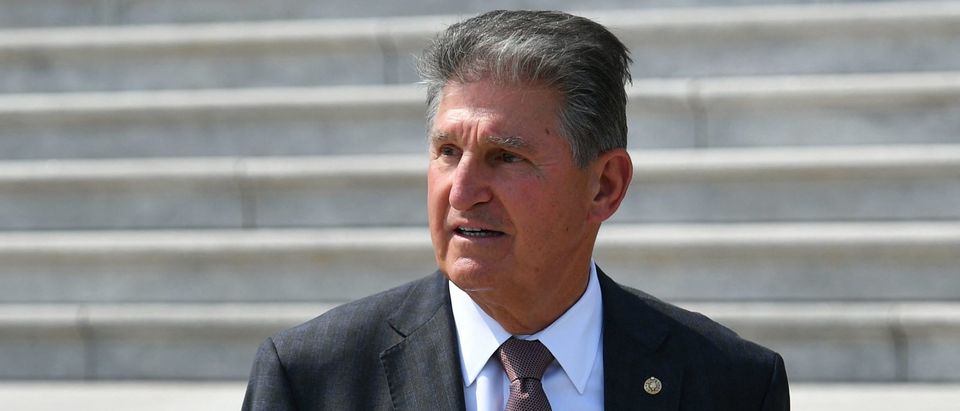In May 2001, Republican Vermont Sen. Jim Jeffords switched parties to become an Independent caucusing with the Democrats. Jeffords thereby transformed South Dakota’s Tom Daschle from Senate Minority Leader to Senate Majority Leader.
This party switch complicated President George W. Bush’s first-term agenda, although through deft, bipartisan negotiating, Bush still secured passage of his signature “No Child Left Behind” education legislation.
With today’s Senate divided 50-50 between both parties (Vice President Harris, as the Senate’s president, can cast tie-breaking votes), two moderate, centrist Democrats, Kyrsten Sinema of Arizona and West Virginia’s Joe Manchin, have been playing outsized roles in urging Democrats to pursue a more moderate and measured approach to Sen. Bernie Sanders’ $3.5 trillion “reconciliation” laundry list of “human infrastructure” spending.
Progressive Democrats in both houses of Congress are unhappy with Sinema-Manchin moderation and are furious that Senate parliamentarian Elizabeth MacDonough (appointed in 2012 by then-Senate Majority Leader Harry Reid) has blocked non-germane proposals like immigration reform from the massive reconciliation legislation.
Sinema won a close 2020 election by just 2.34% in a state that Joe Biden carried against Donald Trump by a mere 0.3% out of 3.4 million votes cast.
Manchin was reelected in 2018 in West Virginia by a less than a four-point margin. Trump carried West Virginia with a massive blowout, besting Joe Biden by nearly 40 points.
Arizona may have turned a slightly cooler shade of purple in 2020, but West Virginia remains blazingly red. So why does Joe Manchin remain a Democrat? Wouldn’t he be better off politically by switching parties?
Perhaps, counterintuitively, wouldn’t the Democratic Party be better off if Manchin defected to the GOP and restored Mitch McConnell as Senate Majority Leader?
Moderate Democrats understand that the 2020 presidential election did not give them a mandate for massive social change. Biden’s victory was mostly a protest vote against Trump’s toxic personality.
Casting centrism to the winds, however, Biden has surprised many of his supporters — and, as recent polls suggest, a growing number of Independent voters — by embracing the progressive left’s Big Government, budget- and deficit-busting spending agenda.
Polling suggests at least some degree of cognitive dissonance among American voters. They favor Biden’s leaving Afghanistan but not the disastrous way he left. They favor the expanded federal-government-provided “free stuff” (expanded Medicare coverage, free community college, universal pre-k, and more) in the reconciliation legislation but worry increasingly about rising inflation, higher taxes and out-of-control federal spending.
Democrats are racing the clock to enact their spending proposals this year while they still have majorities in both congressional chambers. Their thinking is that these proposals will provide a solid record of accomplishment on which to run during next year’s midterms.
Manchin and Sinema are wise to counsel caution. In doing so, however, they face increasing ire from their party’s progressive left.
The Democratic Party’s leadership (Pelosi and Schumer) must pursue a delicate balancing act in reconciling their moderate and progressive wings to secure passage this fall of a $1 trillion infrastructure bill, the $3.5 trillion reconciliation bill, a 2022 budget or a fallback continuing resolution and a debt ceiling increase.
The cognitive dissonance noted above counsels moderation, caution and, perhaps, even delay. If the Biden administration continues to try to ram its policies through an evenly divided Congress, there can be little doubt that next year’s midterm elections will spell political disaster for Democrats.
Ironically, perhaps the best thing for the Democrats today is for Joe Manchin to “pull a Jeffords,” become an Independent and caucus with Republicans. Clearly his West Virginia constituents share political and policy priorities that are more closely aligned with Republicans.
By caucusing with Republicans, Manchin could still play the decisive moderating role he’s pursuing with Democrats and, perhaps, even bring a measured degree of bipartisanship to both congressional chambers. At a minimum, a Manchin “switch” would scramble the Capitol’s political omelet and slow the Democrats’ rush to remake the country in ways that most Americans probably will not like.
Over the coming weeks, Democratic leaders will struggle to reconcile their party’s centrist and left wings. The outcome will significantly impact next year’s midterms. Meanwhile, Republicans face their own internal battles over handling the persistent influence of Trump.
Buckle up and enjoy this fall’s fun political ride!
Charles Kolb served as Deputy Assistant to the President for Domestic Policy from 1990-1992 in the George H.W. Bush White House


